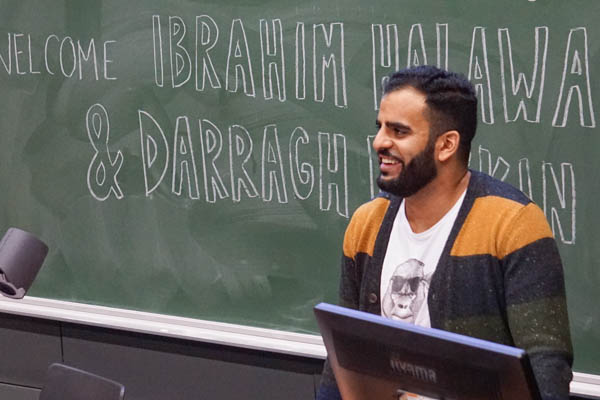
Hope, perseverance and the courage to stand up for what you believe in. These are important virtues by anyone’s standards, but were perhaps even more moving when they came from Ibrahim Halawa during his talk with DU Amnesty and the Free Legal Advice Centre (FLAC) today.
Ibrahim Halawa, who spoke today alongside his lawyer Darragh Mackin, has become a household name in Ireland during the past few years. The story of his plight and his imprisonment in the harsh Egyptian prison system were common features in the media in both Ireland and around the world. The case took years to come to trial until August of last year, with Halawa being acquitted on September 18th 2017.
Halawa’s positivity and tenacity was evident as he spoke to a full lecture theatre. Halawa detailed, with disturbing pictures, the conditions he endured in Egyptian prisons. What was unexpected though was the humour sprinkled throughout his graphic descriptions of beatings and his treatment through his time in prison and he began his talk by revealing to the audience that his initial thought when asked to give the talk was about what he was going to wear.
The vein of humour ran throughout his talk, with Halawa interrupting himself to inform everyone that his sister had just arrived late. Even when speaking about a hunger strike to obtain books that led to a stint in hospital and time in a wheelchair, he jokingly acknowledged “I know it doesn’t show that I went on a hunger strike”.
But rather than dwell on the horrific stories of his imprisonment and treatment in the Egyptian prison, Halawa instead chose to concentrate his talk on more uplifting themes. He urged those listening to remember that his case is just one of many thousands, and that people are having their human rights denied every single day. “My story is over and I’m living my life now. I always try to raise awareness about other people who are just as innocent as I am.”
“When I do these talks, I don’t want to just focus on my story”, he said.
Halawa spoke fondly of the time he received a video from a Trinity choir in which over 100 people sang “Happy Birthday” to him. “I remember thinking that if I die in that place, at least someone will be able to sing for me. If I die, at least someone will remember me.”
The uplifting nature of the talk continued as Mackin took to the floor. He focused on the importance of fundamental human rights and of his experience with the case. He described Egypt as a place where “human rights don’t exist”, and quipped that Halawa had ruined any chances of a future holiday in Egypt for him.
Just like Halawa, Mackin’s talk combined emotional and upsetting experiences with humorous anecdotes, such as when Mackin and his team gained access to the prison by bribing a guard who was wearing a “Kanye West Tour 2009:Dublin” t-shirt.
Mackin referenced a talk he gave in Trinity last year about human rights law, in which he spoke at length about Halawa’s case, remarking that this year he has “come back to Trinity with a real life prop”.
He recalled meeting with Halawa in prison and being accosted by people waiting to visit their family, who shouted their cases at him and begged for his help. He lamented the complex nature of human rights law that leads to cases like Halawa’s being one among far too many.
“Earlier on, Ibrahim told you that I was late. But he didn’t mean I was 10 minutes late for this talk today – he means I was four years late.”
Halawa spoke eloquently about his experience, brushing over the horrors, focusing on his positive memories and lacing the most disturbing of stories with laughs and humour. But despite his light-hearted demeanour, Halawa’s experience has changed and shaped him. He urged those listening to never give up hope and to work to help others. He is eager to stand up for those who are still enduring what he went through, and he wants us to be too.
“Democracy wasn’t only made for Ireland. Democracy wasn’t made for ‘everywhere else’. Democracy was made for the whole world”, he said.
“Never go to bed without thinking: is there someone I can help?”






